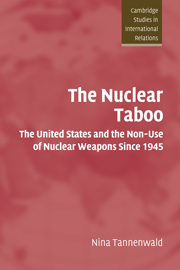Book contents
- Frontmatter
- Contents
- Preface
- List of abbreviations
- 1 Introduction: the tradition of nuclear non-use
- 2 Explaining non-use
- 3 Hiroshima and the origins of the nuclear taboo
- 4 The Korean War: the emerging taboo
- 5 The rise of the nuclear taboo, 1953–1960
- 6 Nuclear weapons and the Vietnam War
- 7 Institutionalizing the taboo, 1960–1989
- 8 The 1991 Gulf War
- 9 The taboo in the post-Cold War world
- 10 Conclusion: the prospects for the nuclear taboo
- Select bibliography
- Index
- CAMBRIDGE STUDIES IN INTERNATIONAL RELATIONS
8 - The 1991 Gulf War
Published online by Cambridge University Press: 22 September 2009
- Frontmatter
- Contents
- Preface
- List of abbreviations
- 1 Introduction: the tradition of nuclear non-use
- 2 Explaining non-use
- 3 Hiroshima and the origins of the nuclear taboo
- 4 The Korean War: the emerging taboo
- 5 The rise of the nuclear taboo, 1953–1960
- 6 Nuclear weapons and the Vietnam War
- 7 Institutionalizing the taboo, 1960–1989
- 8 The 1991 Gulf War
- 9 The taboo in the post-Cold War world
- 10 Conclusion: the prospects for the nuclear taboo
- Select bibliography
- Index
- CAMBRIDGE STUDIES IN INTERNATIONAL RELATIONS
Summary
[T]he Gulf War has preserved the most hopeful single inheritance that we have from the first half-century of nuclear fission – the tradition of the non-use of these weapons since 1945. The Gulf War has in fact reinforced that tradition …
McGeorge Bundy, 1991Iraq's surprise invasion of Kuwait in August 1990 raised once again the issue of use of nuclear weapons. Iraq's extensive conventional capabilities, past history of chemical-arms use, known interest in acquiring nuclear weapons, and revisionist ambitions, made it a textbook case of a post-Cold War Third World adversary. The United States ultimately deployed 500,000 troops to Kuwait in the fastest, farthest, and largest military deployment in the country's history, fought a 35-day air war and a 4-day ground war to defeat Iraq. US leaders ruled out using nuclear weapons even though Iraq was a non-nuclear adversary.
It might be argued that the Gulf War does not offer a good test of the nuclear taboo because the kind of dire circumstances that would call up consideration of a nuclear option never really emerged for the United States and its coalition allies. Nevertheless, this case is significant. It represents the first major conflict of the post-Cold War world, when the threat of nuclear confrontation with the Soviet Union had largely evaporated. At the time, Iraq wielded the world's fourth largest conventional army.
- Type
- Chapter
- Information
- The Nuclear TabooThe United States and the Non-Use of Nuclear Weapons Since 1945, pp. 294 - 326Publisher: Cambridge University PressPrint publication year: 2007

